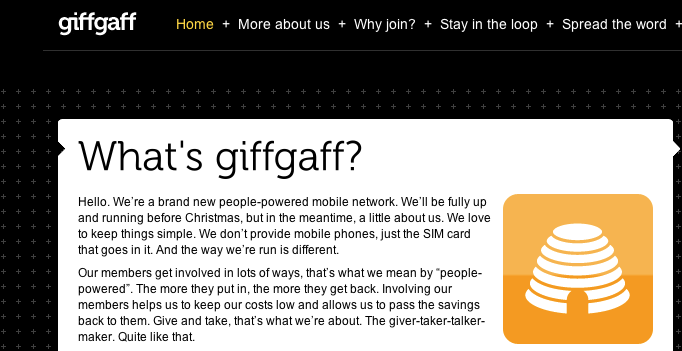 “We're going to involve our members in key decisions as the network grows, and allow them to do things for the business to help keep our costs down.” But not to do that for free - if you participate then you'll be granted a rebate on your bill. “It's possible that a number of users will have all their monthly bills repaid,” a proud Fairman tells me.
“We're going to involve our members in key decisions as the network grows, and allow them to do things for the business to help keep our costs down.” But not to do that for free - if you participate then you'll be granted a rebate on your bill. “It's possible that a number of users will have all their monthly bills repaid,” a proud Fairman tells me.
Tapping into the idea of co-operation from the users is a trend that has gained some ground over the last year or so, both with online services such as Seesmic (www.seesmic.com) using feedback to tailor their video chat site and real time blogging software client; and Dell have their Ideastorm portal to gather opinions; and countless web sites are embracing Web 2.0 tools to engage with their customers.
But Giffgaff is taking this further, certainly a lot further than any of the other UK networks. It was looking at these other companies that fired the idea for Giffgaff. “We thought - how can we harness these tools on the web to create a community of web users?"
Fairman has been working at O2 for the last twelve years, working in telesales, the first O2 online stores and has recently moved away from the home broadband department to work on Giffgaff. “We took the business plan to O2's development unit and they were more than happy to invest in the idea.”
Giffgaff is a fully owned subsidiary of O2, but running as a separate company, and naturally Fairman wasn't going to reveal how much that investment was, but there is plenty of “runway” to use to get the company viable. “The business plan is for five years, and funding is in place from O2 for the life of that plan... as long as we hit our targets as we go along!”
There are a number of MVNO's already thriving in the UK (Supermarket chain Tesco is a good example here), so Giffgaff are going to have to make that unique selling point of community input stand out, and Fairman is honest to say that it is a bit of a gamble wondering how much of the community will get involved. “We still have the resources to do our support if no-one gets involved, but we're making the barrier of entry as low as possible on our forums and knowledgebase sites – but yes, it is experimental.”
An acknowledged rule of thumb online is that 90% of users will consume, 9% will react and only 1% will create. How does that tie into the projections for Giffgaff? “Our ambition is to have one in five [20%] of our members earning back half of their bill. That payment could be in cash, it could be in credit to future bills, and thanks to early feedback, we're adding an option to allow it to be paid to nominated charities.” It's asking a lot of the community, and a lot of the success around Giffgaff is going to be how well they have modelled these numbers and how flexible the back end support will be when relying on the the community for the bulk of basic support.
Of course, all of this is designed to reduce the ongoing support costs of a network – could it be that Giffgaff have found the holy grail; running a support desk that's cheaper than outsourcing it all to India? “Oh I'd never say that”, Fairman replies to my left field view of the operation. “I'd say that yes, we're powering a new low cost model, and we are also rewarding the behaviour and interaction of our community.”
Getting started will be a matter of picking up Giffgaffs only physical product – a SIM card. No phones here, the expectation is that you'll have an unlocked handset kicking around that you can use. “The average mobile phone user in the UK has 1.8 handsets, so there should be more than enough to go round.” And of course it's another way to keep the cost down as much as possible. Why the announcement now if the SIMs aren't ready and pricing hasn't been finalised? “Because we want to engage with people out there, to tap into excited people and those coming to the website.” And probably that will help determine at what price the 'pay as you go' style tarriff (there will be only one at launch) will be set to.

One area that will raise eyebrows is that there is no phone line support for users to call – all interaction will be through the Giffgaff support website. "There is the option for any of the fourteen Giffgaff employees to pick up the phone and call customers if the need arises, but anything initiated by the community members has to go though the website.” I suspect that's going to prove contentious, although with Fairman's experience at O2 perhaps he knows something about ensuring the right questions can be answered without going through a labyrinth of web pages?
The other area of interaction is in company direction – within reason, Giffgaff are going to listen to the community about what services to offer and take on board their ideas. That doesn't mean every idea is going to happen, even though I suspect the other Ewan is going to hit them with his rose tinted wish-list (which I pretty much agree with). They still have a fiduciary responsibility to the Giffgaff board and O2; they have to stay within contract law; and it would need to be something that fits in with their guiding principles (which are, if you're interested, mutuality, a great deal, member involvement, the collective good, keeping it simple, be online only, act as a start up, and be environmentally responsible).
But compare the 'openness to ideas' of the management team to the other networks and you'll realise that there is a social opportunity here unlike any other recent telecoms start-up.
So the crunch is this... will it work? Well, like any start-up, you line up the dominoes as best you can, you break cover and show the world what you've got, and then... “that was the biggest challenge”, admits Fairman, “getting the damn thing launched, but now the challenge is not to present an appeal proposition, which it is, but to start the word of mouth online and getting the community working in the 'right' way.”
So the first steps are successful, and if the service can pick up a decent number of dedicated community members to cover the inevitable support issues (e.g. “why won't my iPhone work, you're O2?” “help, I reset my pin code” or “why can't I just call someone to discuss this bill?”), then I can see this being a company that has the chance to finish that five year plan, and perhaps beyond.
Ewan Spence, All About Symbian, 24 Sep 2009
